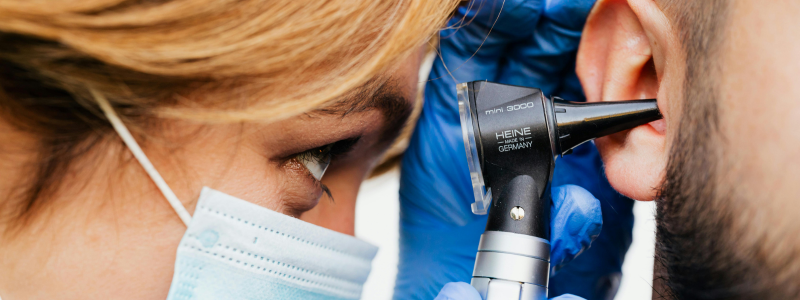
Head of Online Medical Content

Audiology Expert

I think I have hearing loss because I can't hear soft sounds
What should I do?
Overview | Signs you might have hearing loss | Common causes of hearing loss | What to do next | Conclusion
Last Hearing Aid UK Update:
Overview
Struggling to hear soft sounds like whispers, birdsong, or ticking clocks can be an early sign of hearing loss. It often begins subtly, affecting high-frequency sounds important for clear speech. Causes range from age-related or noise-induced hearing loss to earwax buildup or medical issues.
If you’re noticing these changes, the first step is to get a hearing test. Early diagnosis and modern hearing solutions—like discreet hearing aids and assistive tech—can greatly improve your quality of life and prevent further impact on your well-being.
I'm straining to hear soft sounds
Have you found yourself asking people to repeat themselves more often than usual? Straining to catch the subtle rustle of leaves or missing out on the whisper of your kettle just beginning to boil?
If you’ve been thinking, “I think I have hearing loss because I can't hear soft sounds,” you’re not alone, and you’re not imagining things either.
Many people experience the early stages of hearing loss without even realising it, often dismissing these subtle changes as a normal part of life.
We will walk you through the possible causes, why soft sounds matter more than you might think, and the practical steps you can take to assess and protect your hearing health.
The subtle clues you might have hearing loss
Hearing loss isn’t always a quick decline, and for many people, it creeps in quietly. It often starts with an inability to hear softer sounds such as the ticking of a clock, the rustling of paper, birdsong, or the gentle voice of someone speaking from another room.
These are the subtle signs that your hearing may be changing.
Hearing loss doesn’t necessarily mean you’ve gone deaf or that you can’t enjoy a conversation. It often begins with high-frequency sounds fading from your hearing range.
These include consonants like “s”, “f”, and “th”, which are important to understanding speech clearly. So even if you can hear someone talking, it may become harder to make out exactly what they’re saying.
Related reading: Types of hearing loss
Why soft sounds matter
Soft sounds may not seem as important as louder ones, but they’re an essential part of how we experience the world.
They add richness to daily life. Missing them can be frustrating, but it can also affect your safety and well-being. Due to the nature of these sounds, early hearing loss often becomes noticeable.
Common causes of trouble hearing soft sounds
There are several potential reasons you might struggle with quiet noises:
- Age-related hearing loss (presbycusis): Age-related is the most common form of hearing loss, affecting people gradually as they get older, often starting with high-pitched and soft sounds.
- Noise-induced hearing loss: Noise-induced hearing loss is long-term exposure to loud environments that can damage the sensitive hair cells in your inner ear.
- Earwax build-up: It sounds simple, but something as basic as a wax blockage can reduce your ability to hear soft sounds until it’s removed.
- Medical conditions or infections: Things like ear infections, fluid in the ear, or certain medications can temporarily or permanently impact hearing.
- Genetics or underlying health conditions: Some people are simply more prone to hearing changes, and conditions like diabetes or cardiovascular disease can also affect ear health.
What can you do about it?
1. Get a hearing test
The first step is simple: book a hearing test with an audiologist. These tests are painless, quick, and incredibly informative. You’ll find out whether your hearing is within the normal range, and if not, where the issues lie.
Like us, many high-street hearing services offer free hearing checks. However, unlike most, we offer home visits at no extra cost. You can also ask your GP for a referral on the NHS. Even if it turns out your hearing is fine, it’s reassuring to know.
2. Be honest about what you’re missing
It helps to take note of specific sounds or situations you’re struggling with. Is it a soft voice? Background noise in restaurants? The more detailed you can be, the easier it is for professionals to help pinpoint what’s going on.
3. Don’t delay
There’s a strong link between untreated hearing loss and mental health concerns such as isolation, anxiety, and even cognitive decline. It’s easy to brush off small signs like missing soft sounds, but over time, the impact grows. The earlier you seek help, the better the outcome.
Technology has come a long way
If you do have hearing loss, the solutions today are more advanced and less intrusive than ever before. Hearing aids are smaller, smarter, and more effective at amplifying only the sounds you need support with.
Some can even stream audio from your phone or help reduce background noise in crowded places.
And it’s not just hearing aids, there are apps, assistive accessories, and lifestyle changes that can make a real difference. Hearing changes are incredibly common. In the UK, around one in six adults has some form of hearing loss.
It’s nothing to be embarrassed about, and talking about it is the first step towards better hearing and a better quality of life.
Related reading: Hearing aid technology
Summary
Difficulty hearing soft sounds—like whispers or birdsong—can signal early hearing loss, often affecting high-frequency sounds important for understanding speech. Common causes include ageing, noise exposure, earwax build-up, and medical conditions.
If you notice these signs, it's important to get a hearing test and seek support early. Modern hearing aids and assistive technology can significantly improve communication and overall quality of life.
Why Choose Us?
- FREE Hearing Tests
- Best Hearing Aids and Prices
- FREE Aftercare for Life
- FREE Home Visits
- 200+ Local Audiologists
- 60 Day Money Back Guarantee
I struggle to hear soft sounds. Could I have hearing loss?
If you’ve found yourself thinking, “I think I have hearing loss because I can’t hear soft sounds,” then it’s time to trust that instinct. It’s your body’s way of telling you something has shifted. Just like with your eyesight or your teeth, getting it checked and supported early is the best thing you can do.
Hearing the quietest parts of life, soft voices, subtle noises, whispered moments, isn’t a luxury. It’s a key part of feeling connected, safe, and engaged. If those moments are slipping away, don’t wait. Speak to someone, book a test, and take control of your hearing health.
Other hearing loss awareness articles you might like...
 Hearing aid stigma
Hearing aid stigma  How to tell if hearing loss is permanent or temporary
How to tell if hearing loss is permanent or temporary  Ways to keep your ears healthy
Ways to keep your ears healthy Our specialist service includes:
Do not spend hundreds of pounds without getting a second opinion from us.
Please call us on 0800 567 7621
 Not only are the prices great, but the service is fantastic! Many thanks to your team.
Not only are the prices great, but the service is fantastic! Many thanks to your team.What's included in our hearing aid prices?
Other pages you might find useful
Ask the Experts
6 Morton Lane
Walkwood
Redditch
Worcestershire
B97 5QA
Latest Launch
When we refer to a product as 'Latest Launch', we mean it is the latest to be released on the market.
New
When we refer to a product as 'New', we mean that the product is the newest hearing aid model on the market.
When we refer to a product as 'Superseded', we mean that there is a newer range available which replaces and improves on this product.
Older Model
When we refer to a product as an 'Older Model', we mean that it is has been superseded by at least two more recent hearing aid ranges.
